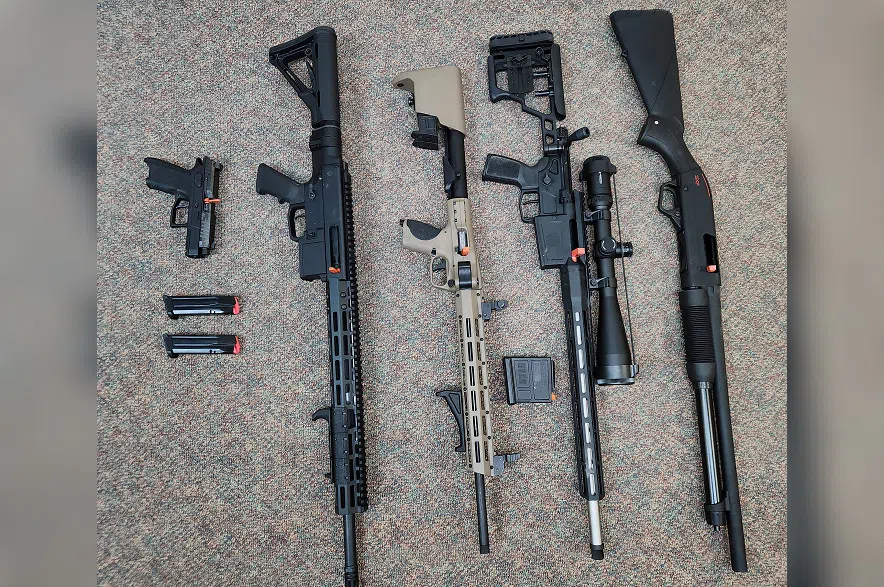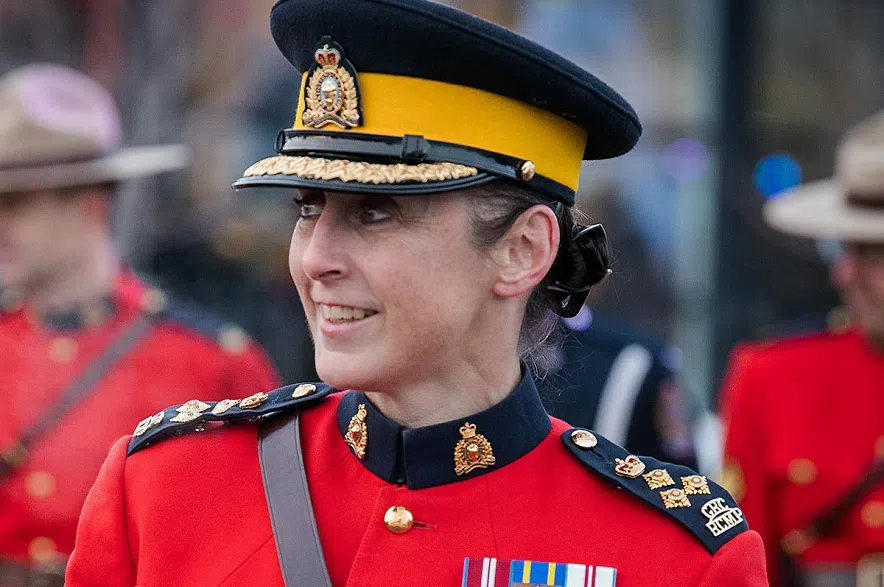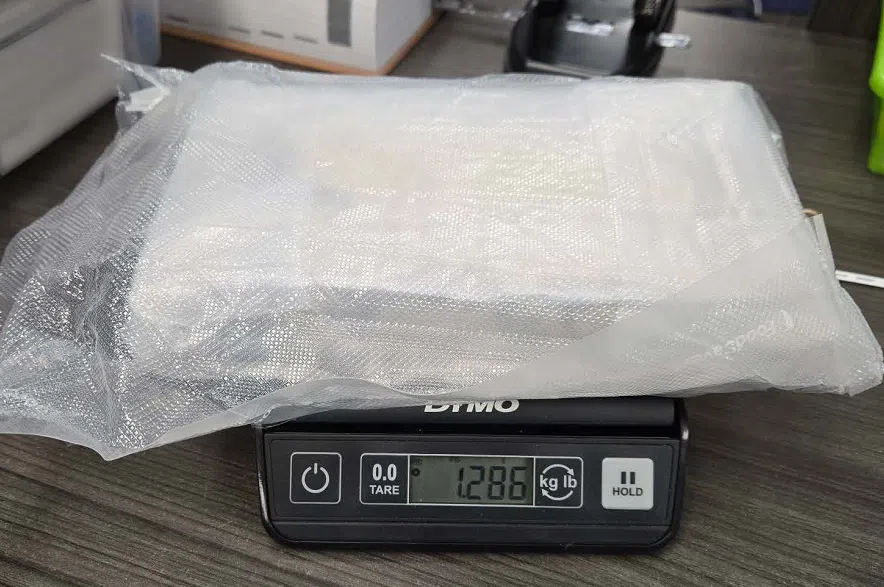Assistant Commissioner Rhonda Blackmore, the officer in charge of the Saskatchewan RCMP, joined the Evan Bray Show on Friday morning to check in on a number of different topics, including crime statistics from 2024, drug seizures, border security, bear spray and the Saskatchewan Marshals Service.
The conversation started with a discussion of the homicide numbers for 2024, which Blackmore said set a new record for the province.
Read More:
- RCMP warns of treacherous highway conditions across Saskatchewan
- 16-year-old Regina girl charged, uttering threats against a school
- Customs and Immigration Union questions Sask. border security plan
Listen to the full interview here, or read the transcript below:
The following transcript has been edited for length and clarity.
EVAN BRAY: I always like to do a check in on on crime stats, and especially now we’re reflecting back on 2024 How did the year end, Rhonda, in terms of trends that you saw in the province? Where were your pressure points?
RHONDA BLACKMORE: Right now, we’re putting a year-end summary together, so I don’t have complete stats, but as is the end of November we’ve seen a four per cent decrease in calls, which is really good to see. Although we have some troubling statistics – we had 40 homicides this year, which is unfortunately a record number for us here in Saskatchewan, so a significant increase that we’ve seen year-over-year and again at the end of November, you know, that was almost a 25 per cent increase from the previous year. So lots of concerns there as we continue to see some of those increases in violent crimes. We have in some areas, seen some minor decreases in some categories of property crime, but again, lots of concerning numbers that we continue to focus on.
How do you combat the murder problem in the province, because it’s not one that you can go out and do some targeted enforcement. How do you handle some of this violent crime that doesn’t seem to be getting better?
BLACKMORE: So much of violent crime is linked to other issues, be it drugs, be it firearm trafficking, intimate partner violence. Those are, in many, many cases, the underlying issues – mental health issues. And we see that manifesting itself in escalations and, unfortunately, sometimes results in homicide. We need to look at the root causes and the core issues, and if we can start to get a handle on some of those issues, not just from a policing perspective, because in many of those cases we’re not going to arrest our way out of those problems. We’re going to have to have a fulsome approach with other agencies that deal with some of the core issues as well. And if we can get a handle on some of those, I do think we could see some of those violent-crime numbers decrease.
You brought up drugs. You’ve had a number of big drug busts again recently – three charged after 1.2 kilograms of cocaine was seized during a traffic stop. Is this continued, focused enforcement, or is some of this just that the drugs are so prevalent that your officers are encountering it every day?
BLACKMORE: Well, I think it certainly speaks to the amount of drugs that we’re seeing coming into the province, unfortunately. We’ve had recent drug busts – 1.2 kilograms of cocaine in Kamsack. You may have seen the media release where we had over 1,500 pounds of illegal cannabis confiscated during a traffic stop on Highway 1. Back in November our roving traffic unit got 50 kilograms of cocaine out of a vehicle. And so those numbers – big, big numbers – really indicate the extent of the problem. Because, you know, we’re not kidding ourselves that we’re getting all the drugs out there, out of every vehicle. That’s that’s for sure. We’re doing our best, but it really is, unfortunately, so prevalent, and again, it speaks to the demand. You know, they’re not going to transport drugs into a province where there’s no demand, and it goes back to some of those addictions issues that there, unfortunately, is a demand. They’re able to sell their product here.
Recently, there was a story about the RCMP involved in charging three with drug trafficking at the Saskatchewan Penitentiary, using a slingshot to throw the drugs over the fence into the yard. This is not a new problem, is it?
BLACKMORE: No, it’s always been a problem. You know, with the advancement of drones and those pieces of technology, we’re certainly seeing different ways or different attempts to try to to get drugs into the penitentiary. But as you said, this is not new. The staff is always aware at the penitentiary. They do an exceptional job of trying to intercept those illegal drugs and contraband coming into the penitentiary, so we’re very happy to support them when we can in in preventing that from happening.
Is there any proactive work that you, or even correction Service Canada, can do? Because it’s not just penitentiary – it’s the correctional centers in the province as well. Is there proactive work that can be done to try and prevent this from happening in the first place?
BLACKMORE: Well, I think it goes back, like I was saying, to that demand, right? If there’s no demand, there’s no need for drugs. But unfortunately, when we have addictions issues and when there’s a market for it, then people are looking for a supply. And it’s no different in those correctional facilities. But one of the things that we hope to see more of in the future is that rehabilitation part of it, be it before people are incarcerated (or) during incarceration, looking to hopefully get people on a better path than than those addictions to those illegal drugs that do so much harm and so much damage to people and families and our communities here in Saskatchewan.
Saskatoon lately has been dealing with bear spray problems. They just had two security guards at the Midtown mall bear sprayed again here just this past week. It’s happening on city buses. It’s happening outside of stores. It’s happening to innocent people. Is bear spray continuing to be a problem that you see in the RCMP jurisdiction?
BLACKMORE: We certainly see it as a weapon being used in certain instances. We don’t we haven’t done an assessment for this year, but we did do that in 2022, and we had 566 files that involved bear spray that year. So it’s significant, for sure. This summer, we had an event in one of our northern communities where bear sprayed was deployed, and it impacted a large number of attendees at that event. So we’re certainly seeing it alongside other weapons being used. And it’s one of the reasons why we were so glad to see the province moving forward with legislation that allows communities to take action and that give us the tools that we have that legal enforcement action for people possessing bear spray in in public.
There’s recently a story about the marshal service, which, of course, is in its its infancy. It’s starting now to do some recruiting to fill those operational positions. We know that the end goal is to have 70 positions. I think they’re hoping to hire 20 or 30 in the next little while. There’s been a couple of finger points to say “all that’s happening is they’re poaching from existing police forces.” Has this been a problem for Saskatchewan RCMP?
BLACKMORE: At this point, I’m not aware of anyone who has been hired from the RCMP to the marshals. That’s not to say someone isn’t in the process right now, but no one that I’m aware of that’s been hired. But when you’re looking for experienced police officers the key word there is they’re experienced. They come from another agency. So you know, that’s the category of police officer they’re looking for. And given the fact that they are in Saskatchewan, Saskatchewan agencies are probably going to be where some of those individuals come from. We see it fairly regularly, you know, police officers moving around, be it they’ve done a full career with one agency and maybe they have a few more years in them, but they’re looking for a different experience, be it RCMP, looking to maybe not move around as much and want to settle into one spot, or municipal members who are now looking for a little more adventure, to experience different communities and want to move around. So we do see that fairly regularly within the policing community of experienced police officers.
I remember one time seeing a stat with the Regina Police Service when I was there, that Regina Police Service, proportionately had the most ex-RCMP or former RCMP members of any police service in Canada, predominantly because they come to Regina to train. So I think many times they come to Regina to train, they end up meeting someone. And while they may get posted somewhere across Canada, eventually they want to come back home. And so I think we had, out of 450, 500 police officers, we were up to almost 45 or 50 former RCMP members in the city of Regina. So I think the point is it could and does happen within agencies all over, not just the province, but Canada.
BLACKMORE: For sure. And here in Regina, you know, we not only have RCMP doing operational police work under my command, we also have depot, as you mentioned, the training facility, so they’re training here. But also we have individuals who are working there doing the instruction. So we sort of have a high concentration of Mounties in the city of Regina to begin with, as well as the trainees. I truly believe Saskatchewan is the best-kept secret, and people come from across the country and they come to Saskatchewan and meet someone, because we have outstanding people in this province, and they decide to stay. And maybe that means, though, they don’t want to move around throughout the province, and, you know, and move over to the Regina Police Service.
We we’ve been talking a lot about border security over the last while. Since Donald Trump basically brought the conversation up it’s been a topic of conversation many people have had. Recently, our province announced the Saskatchewan Border Security Plan. Were you involved much in the planning of that? Because the RCMP right now do hold the responsibility between border crossings and border security. Were you involved in those discussions?
BLACKMORE: We were, more so from a perspective of consulting the police as to “this is what is being discussed,” and what does that look like, also getting input from the RCMP as far as what resources could be re-prioritized and where crime is happening throughout the province. I think the provincial ministry has actually done a really good job in Saskatchewan in assessing what can we be doing and what should we be doing. Because, I think, if you jump to be first out of the gate to have a plan, you may not be taking everything into consideration. Between the border enforcement team that’s our federal policing agency here, the RCMP, and technology used to protect the border, we have a relatively good handle on things, whereas in some communities, as we discussed earlier, we are seeing violent crime. So I think the ministry did a great job – and the province – in balancing that, what that looks like. Making sure that the border does have security and additional resources if needed, but making sure that we’re not taking away from communities where we are seeing crime and needs for policing in those communities.
How big of a problem is illegal crossings between border crossings in the province? I know there was a recent case of firearms that were ditched over the border. Is this a common problem for us?
BLACKMORE: That’s our federal side of policing, but from our perspective here, we don’t see it that often. I mean, it does happen for sure, but again, the key point is those individuals were apprehended, and again it speaks to the measures that are in place at the border to detect those individuals who are trying to enter the country and not report through one of our border crossings with CBSA.

The investigation at the border saw Saskatchewan RCMP officers seize a number of prohibited firearms. (Saskatchewan RCMP/Submitted)
There was a big news conference yesterday, province wide, you were involved in regarding Amber alerts. What was that highlighting?
It was an opportunity for both Regina Police Service and the RCMP, and the same thing happened up in Saskatoon with the Saskatoon Police Service, to convey messaging around Amber alerts and just make sure that the media understands where the police are coming from, and the police understand the media’s position. So we had an opportunity to run through a tabletop exercise, which I think was really beneficial, and explained some of the challenges, some of the considerations that must be part of an Amber Alert release. And you know, it really goes back to how we do business here in this province. We all need to work together, make sure that we’re promoting public safety and keeping people safe, and that goes hand in hand. Police agencies working together, but also working with the media, because they are a great tool for us in getting information out to the public.












